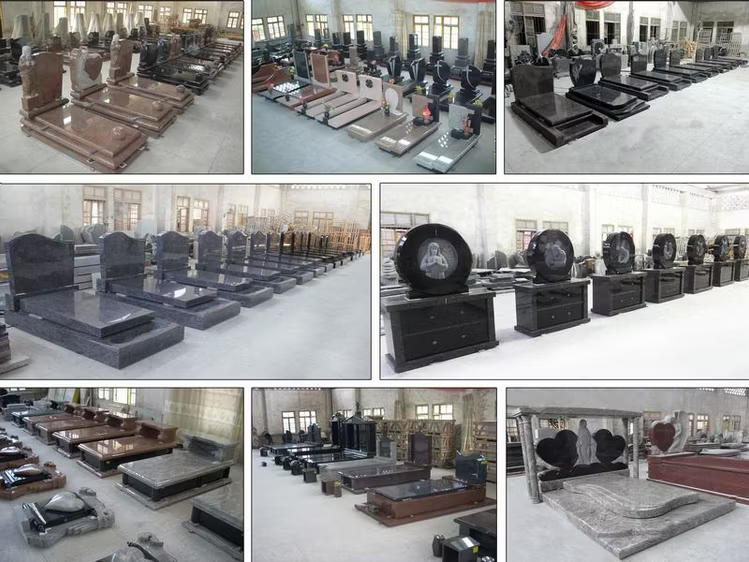When it comes to honoring the lives of loved ones, families turn to professionals for guidance. As a B2B buyer or service provider in the memorial industry, understanding the differences between memorial providers and cemeteries is crucial for delivering the best value to your clients. Whether you’re a funeral home, monument retailer, or distributor, choosing the right supply and service partner directly impacts your reputation and profitability.
This article explores the unique roles, benefits, and limitations of both memorial providers and cemeteries, helping you determine the best fit based on your clients’ needs
What Is a Memorial Provider?
A memorial provider is a company or manufacturer that specializes in creating and supplying granite headstones, grave markers, monuments, plaques, cremation urns, and related memorial products. These providers often offer a wide variety of designs, stone types, sizes, finishes, and personalization options. Many of them cater directly to funeral homes, memorial retailers, and cemeteries, offering competitive B2B pricing and custom solutions.
Key Benefits of Memorial Providers:
- Customization: They offer extensive design flexibility, including engraving, artwork, shapes, and materials like granite, marble, or sandstone.
- Wholesale Pricing: Since they cater to bulk buyers, pricing is competitive, especially for resellers and dealers.
- Quality Assurance: Memorial manufacturers typically use advanced fabrication methods, ensuring durability and long-lasting results.
- Fast Turnaround: Many providers offer quick production and shipping timelines, ideal for businesses with multiple client deadlines.
Memorial providers are ideal for businesses looking to offer clients more options, unique designs, and premium craftsmanship that cemeteries often cannot provide.
What Is a Cemetery’s Role?
Cemeteries primarily offer burial space and related services. They may also provide basic memorial products like flat grave markers or upright headstones, typically as part of a burial package. However, cemeteries tend to work within fixed regulations, including limitations on the size, shape, and color of headstones to maintain uniformity across their grounds.
Common Services Offered by Cemeteries:
- Sale of burial plots and columbarium niches
- On-site installation of headstones or grave markers
- Maintenance of burial grounds
- Basic memorial product options with limited customization
While cemeteries play a critical role in the memorial process, their offerings are generally limited in design variety and scope compared to specialized memorial providers.
Key Differences Between Memorial Providers and Cemeteries
| Feature | Memorial Provider | Cemetery |
|---|---|---|
| Product Range | Wide variety with full customization | Limited selection, often standardized |
| Customization Options | High: engravings, colors, materials | Low to moderate |
| Pricing | Competitive, wholesale pricing | Often bundled or marked up |
| Installation | Supplied only (installation by buyer) | On-site installation services included |
| Delivery | Nationwide or international shipping | Typically local and on-site only |
| Buyer Focus | Funeral homes, retailers, distributors | Families directly |
Which Is the Right Fit for Your Clients?
If your clients prioritize personalization, budget-friendly pricing, and premium quality, a memorial provider is often the better fit. Working with a supplier allows you to offer a broader product catalog, respond to unique requests, and maintain control over your margin. Memorial providers are also more suitable for B2B businesses handling multiple orders or managing customized requests across different cemeteries. You can source bulk orders, custom-designed monuments, and tailored memorial products without being constrained by local cemetery guidelines. On the other hand, if your client values a simplified, one-stop solution where everything from burial to basic memorial is handled in-house, then a cemetery may suffice. However, these solutions are usually limited in terms of product variety and customization.
How to Choose the Right Memorial Partner
As a business, your choice of supply partner should reflect your clients’ expectations, project timelines, and pricing strategies. When evaluating a memorial provider, consider the following:
- Product Range: Do they offer the materials, shapes, and styles your clients prefer?
- Lead Times: Can they meet your delivery schedule consistently?
- Customization Capabilities: Are engraving, etching, or design options available?
- Support Services: Do they offer design mockups, shipping assistance, or installation guides?
- Reputation: Check for reviews, certifications, and client references.
Choosing a reliable, flexible, and responsive memorial provider can elevate your business offerings and strengthen customer loyalty.
Why Stone Discover?
At Stone Discover, we specialize in manufacturing and exporting high-quality memorial products, including upright headstones, flat markers, granite plaques, cremation urns, and columbariums. With our base in India, we combine traditional craftsmanship with modern technology to serve global partners with:
- Competitive wholesale pricing
- Custom design and engraving options
- Reliable global shipping
- Dedicated B2B support
Whether you run a funeral home, supply headstones, or manage a retail outlet, Stone Discover ensures you have access to premium memorial products that meet your clients’ needs.
Final Thoughts
While cemeteries are essential for final resting places and basic services, memorial providers bring greater value to businesses seeking product diversity, flexibility, and profit margin. For B2B buyers, working with a trusted memorial manufacturer like Stone Discover offers the freedom to deliver personalized, high-quality memorials while building a reliable supply chain. Evaluate your client base, business model, and service goals to decide the best path forward. In most cases, partnering with a dedicated memorial provider ensures you deliver not just products, but lasting tributes that families cherish.



